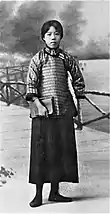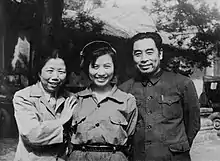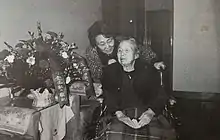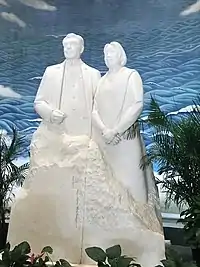Deng Yingchao
Deng Yingchao (simplified Chinese: 邓颖超; traditional Chinese: 鄧穎超; pinyin: Dèng Yǐngchāo) (4 February 1904 – 11 July 1992) was the Chairwoman of the Chinese People's Political Consultative Conference from 1983 to 1988, a member of the Communist Party of China, and the wife of the first Chinese Premier, Zhou Enlai.
Deng Yingchao | |
|---|---|
.jpg.webp) Deng Yingchao in 1954 | |
| 4th Chairwoman of the National Committee of the Chinese People's Political Consultative Conference | |
| In office June 1983 – April 1988 | |
| Preceded by | Deng Xiaoping |
| Succeeded by | Li Xiannian |
| Second Secretary of the Central Commission for Discipline Inspection | |
| In office 22 December 1978 – 11 September 1982 | |
| Preceded by | Post established |
| Succeeded by | Huang Kecheng |
| Personal details | |
| Born | 4 February 1904 Nanning, Guangxi, Qing Empire |
| Died | 11 July 1992 (aged 88) Beijing, People's Republic of China |
| Nationality | Chinese |
| Political party | Communist Party of China |
| Spouse(s) | Zhou Enlai (m. 1925–1976) |
| Relations | Sun Weishi (adopted daughter) |
Early life

With ancestry in Guangshan County (光山縣), Henan, she was born Deng Wenshu (鄧文淑) in Nanning, Guangxi. Growing up in a poverty-stricken family, her father died when she was at a young age and her single mother taught and practiced medicine. Deng studied at Beiyang Women's Normal School.[1] Deng participated as a team leader in the May Fourth Movement, where she met Zhou Enlai in 1919. They married on 8 August 1925 in Guangzhou. Deng joined the Communist Youth League of China (CYL) in 1924 and became a member of the Communist Party of China (CCP) in 1925.[2] After the White Terror massacres in 1927, Deng worked underground in Shanghai for five years.
Chinese Civil War

Deng was one of the few women to survive the Long March.[3] However, during the Long March she developed pulmonary tuberculosis.[4]

After the victory of the Anti-Japanese War, Deng Yingchao, as the only female representative of the Chinese Communist Party, attended the first Political Consultative Conference in Chongqing . In 1946, she was elected as a council member of the International Democratic Women's Federation. In March 1947, she has served as a member of the Rear Working Committee of the CPC Central Committee and acting secretary of the Women's Committee of the CPC Central Committee. In June 1949, she was elected as a member of the Preparatory Committee of the National Committee of the Chinese People's Political Consultative Conference and became a member of the drafting group of the " Common Program ". Later, entrusted by Mao Zedong and Zhou Enlai, she personally went to Shanghai and invited Soong Ching Ling to Beijing to participate in the preparation of the Central People's Government of the People's Republic of China.
People's Republic of China

When the People's Republic of China was founded, Deng Yingchao was elected to the National Women's first to the third vice chairman, honorary chairman of the Fourth; Chinese People's Conseil national children's vice chairman. Since the Eighth National Congress of the Communist Party of China, Deng Yingchao has been a member of the Central Committee of the Communist Party of China, but has never held a government position. It was not until the death of her husband Zhou Enlai in 1976 that she returned to the political arena of the Communist Party. In December of that year, at the third meeting of the Standing Committee of the Fourth National People's Congress , she was added as the vice chairman of the Standing Committee of the National People's Congress.
In March 1978, after being re-elected as the vice chairman of the Standing Committee of the Fifth National People’s Congress, Deng Yingchao served as the second secretary of the newly restored CPC Central Commission for Disciplinary Inspection at the Third Plenary Session of the Eleventh Central Committee of the Communist Party of China that year. Co-opted as a member of the Political Bureau of the Central Committee.
Soon thereafter, Deng Yingchao used her early contacts and contacts with the Kuomintang, as well as her network and reputation in the United Front work, to fully take charge of the work of the Central Committee of the Communist Party of China in Taiwan, and concurrently served as the leader of the newly established " Leading Group of the Central Committee for Taiwan Work ". In 1982, she served as Honorary Chairwoman of the Chinese People's Association for Friendship with Foreign Countries. From June 1983 to March 1988, she served as Chairwoman of the National Committee of the Chinese People's Political Consultative Conference.

In September 1985, Deng Yingchao voluntarily applied for resignation as a member of the Central Committee of the Communist Party of China; and in April 1988, after the expiration of the term of the chairman of the National Committee of the Chinese People's Political Consultative Conference, she resigned and recuperated.[5]
In 1987, she served as Honorary Chairwoman of China Population Welfare Foundation. On the same year, when party hard-liners ousted the party's General Secretary, Hu Yaobang, in a campaign against "bourgeois liberalism," it published a 25-year-old speech by Deng. In June 1989, during the Tiananmen Square protests, she supported the leadership's decision to violently suppress the protests.[6]
In October 1990, she resigned as honorary president of the Chinese Nursing Association, due to poor health. In 1991 she served as Honorary Chairwoman of China Society for People's Friendships Studies.
Personal life
Deng and Zhou had no children of their own. However, they adopted several orphans of "revolutionary martyrs", including Li Peng, who later became the Premier of the People's Republic of China. She promoted the abolition of foot binding imposed on women.
Death and Legacy

After retiring, Deng Yingchao's body gradually weakened; especially in 1990, she was admitted to the hospital five times because of colds and pneumonia; in August 1991, she began to suffer from renal failure and became unconscious for several times.[7]
At 6:55 am on July 11, 1992, Deng Yingchao died in Beijing Hospital at the age of 88. After cremation, her ashes were scattered in the same place where Zhou Enlai's ashes had been scattered. The official Party evaluation of her is "a great proletarian revolutionary, politician, famous social activist, staunch Marxist, outstanding leader of the party and the country, pioneer of the Chinese women's movement, and highly respected chairman of the Sixth CPPCC"[8]。
There is a memorial hall dedicated to her and her husband in Tianjin (天津周恩來鄧穎超紀念館).
References
- Lv Bicheng: Newspaper Woman, Educator and Buddhist, Frank Zhao, 13 January 2014, Women of China, retrieved 11 April 2014
- Mengjia, Yuan. "Reliving the Life Stories of Deng Yingchao and Premier Zhou". Women of China. All-China Women's Federation. Retrieved 4 August 2020.
- Long, Simon. "Obituary: Deng Yingchao". The Independent. The Independent. Retrieved 4 August 2020.
- Snow, Edgar (1968). Red Star over China. New York: Grove Press. pp. 500–501. ISBN 978-0-8021-5093-6.
- "邓颖超" [Deng Yingchao]. 新华网. Archived from the original on 2008-03-21.
- "Deng Yingchao, a Party Leader And Widow of Zhou, Dies at 88". The New York Times. Retrieved August 6, 2020.
- 赵炜. "邓颖超临终前说的最后俩字竟是"李鹏"".
- "邓颖超同志光辉战斗的一生". 人民网.
External links
- Deng Yingchao: a painting and a b/w photo
- Exterior of the Memorial Hall
| Honorary titles | ||
|---|---|---|
| Preceded by None |
Wife of the Premier of the People's Republic of China 1949–1976 |
Succeeded by Han Zhijun |
| Political offices | ||
| Preceded by Deng Xiaoping |
Chairman of the Chinese People's Political Consultative Conference 1983–1988 |
Succeeded by Li Xiannian |
_logo.svg.png.webp)